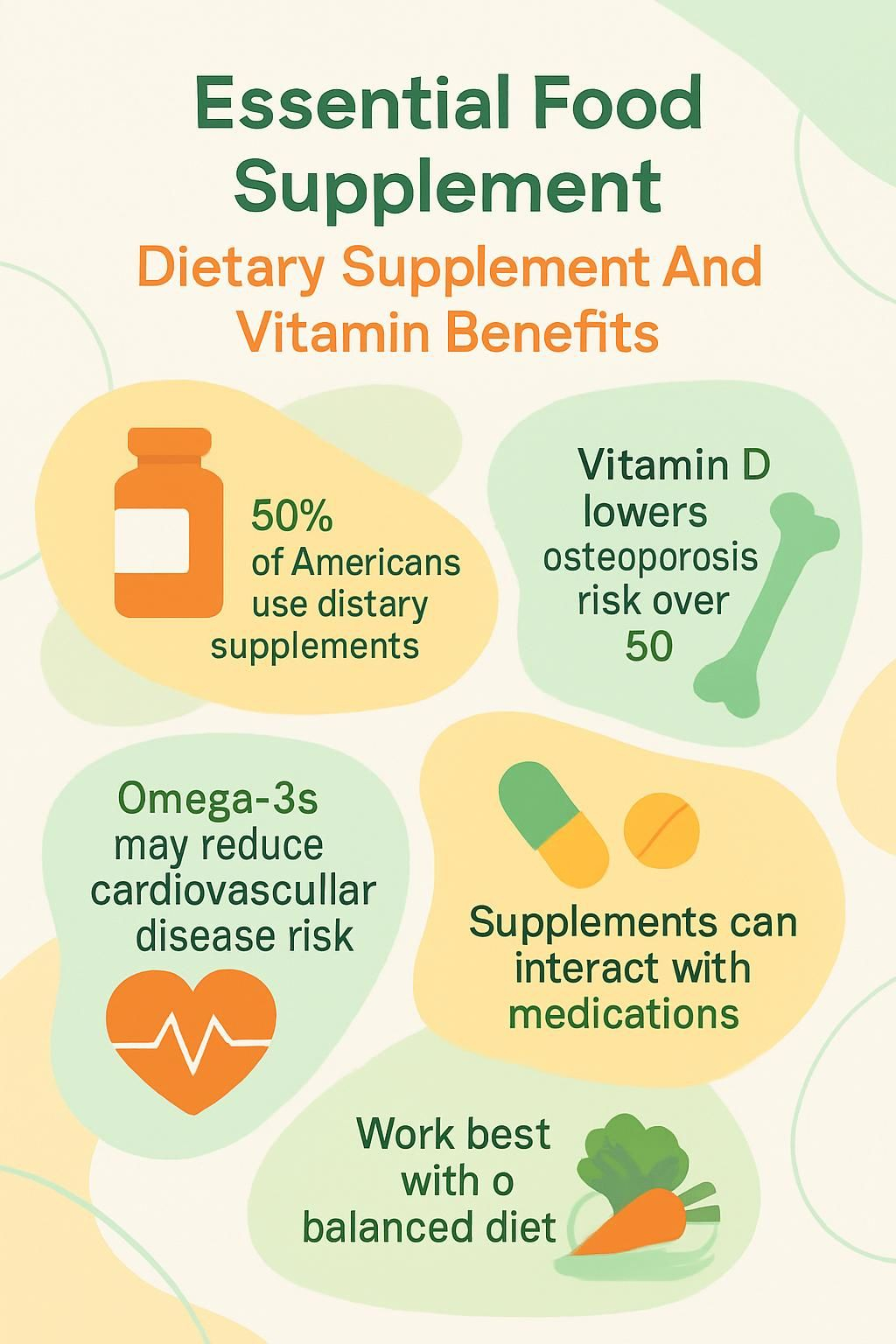Essential Food Supplement: Dietary Supplement And Vitamin Benefits
Our Nutrition Assistant AI Suite will transform your body. You will lose fat, get toned, and build muscle. Gain confidence and optimal health.
Feeling tired, low on energy, or getting sick a lot can be frustrating. A dietary supplement may help fill nutrient gaps when regular meals fall short. Many adults in the United States use food supplements to support vitamins, minerals, or a probiotic for gut health.
This guide explains how vitamins and supplements can support strong bones, immune defenses, and energy. You will also learn how to use them safely and choose what truly fits your needs.
Key Takeaways
- Vitamins, minerals, and probiotics help close nutrition gaps for about half of Americans, with special value for older adults, pregnant people, and athletes.
- Key vitamins such as D, B12, and C support bone strength, energy metabolism, and immune function. Vitamin D plus calcium can lower osteoporosis risk in adults over 50.
- Omega-3 fatty acids from fish oil may reduce cardiovascular risk, though results on LDL cholesterol vary in large studies of more than 400,000 participants.
- Supplements may cause side effects or interact with medicines. Always read dietary supplement labels and talk with a healthcare provider first.
- Supplements work best alongside a balanced diet rich in fruits, vegetables, dairy, and whole grains, plus regular physical activity.

What Are Dietary Supplements?

Dietary supplements are products you take to add essential nutrients to your diet. Many supplements contain vitamins, minerals, herbs, amino acids, or probiotics that support health.
What is the definition and purpose of dietary supplements?
Dietary supplements include vitamins, minerals, herbs such as echinacea, amino acids, enzymes, and other compounds. They come as tablets, capsules, powders, gummies, and liquids.
Their purpose is to supplement the diet when food does not provide enough of a nutrient. For example, calcium supports bones and teeth, while vitamin B12 helps with red blood cells and energy.
Supplements cannot claim to diagnose, treat, or cure disease. They are regulated by the Food and Drug Administration under different rules than prescription drugs. Companies are responsible for safety and accurate dietary supplement labels, though the FDA does not review each product for effectiveness before sale.
“Supplements can fill nutritional gaps but should never take the place of a healthy diet.” Many people use a multivitamin if their meals lack variety from fruits, vegetables, whole grains, and dairy foods like yogurt and cheese.
There are several types of products that support specific goals or life stages.
What are the different types of dietary supplements?
You will find many categories and formats. These products can help meet needs that your regular diet may miss.
- Vitamins: Common choices include vitamin D, vitamin C, and vitamin B12 for bone health, immunity, and energy.
- Minerals: Calcium, iron, magnesium, and zinc support bones, oxygen transport, nerves, and the immune system.
- Amino acids: Creatine and other amino acids may support strength and exercise recovery. Protein powders are popular in sports nutrition.
- Fatty acids: Fish oil provides omega-3s like EPA and DHA. Regular intake may reduce cardiovascular disease risk, according to the American Heart Association.
- Botanical supplements: Plant-based options such as echinacea, curcumin, and garlic. Plant origin does not guarantee safety, and some botanicals can cause adverse effects.
- Probiotics: Live bacteria that support the gastrointestinal tract and gut balance. Available as capsules or drinks.
- Fiber supplements: Added fiber supports digestion and bowel regularity. Helpful if your diet is low in produce and whole grains.
- Specialty compounds: Products like alpha-lipoic acid are marketed for antioxidant support, and formulas vary by supplement companies.
These products appear as tablets, capsules, gummies, powders, and drinks, and in fortified foods like breakfast cereals. Always read the Supplement Facts label for serving size, ingredients, dose, interactions, and possible side effects before taking dietary supplements.
Benefits of Dietary Supplements
Supplements can help bridge nutrition gaps when meals lack certain vitamins and minerals. Research shared by dietitians and public health agencies supports specific benefits for some groups.
How do supplements fill nutritional gaps?
Many people fall short on key nutrients. For instance, about half of Americans do not get enough magnesium, especially older men and those with health conditions.
A calcium supplement can help if you are at higher risk for osteoporosis or cannot get enough from milk, seeds, beans, almonds, and other calcium-rich foods.
Iron supports growth and energy. Children, pregnant people, adults with heavy menstrual cycles, and some older adults may struggle to meet iron needs from beef and leafy vegetables alone.
A doctor once found my iron levels were low. A short course of iron tablets improved my energy within weeks. Always match your dose to Dietary Reference Intakes, and check the nutrition facts label to avoid excess intake.
How can supplements support overall health and wellness?
After you fill gaps, vitamins and supplements can help maintain whole-body health. Many daily products offer support that extends beyond basic nutrition.
Omega-3 fatty acids from fish oil may lower triglycerides in people with heart concerns. Probiotics can support a healthy gut by encouraging helpful bacteria.
“Taking a dietary supplement is not a substitute for eating a variety of foods,” notes the Office of Dietary Supplements.
Zinc and vitamin C may support immune defenses. Clear Supplement Facts labels help you compare active ingredients, serving size, and amount per serving.
Follow dietary guidelines to lower the risk of side effects. Make changes one product at a time and monitor how you feel.
How do supplements boost immune function?
Immunity relies on vitamins and minerals. Zinc supports white blood cells that fight infection and may shorten the length of colds if taken within 24 hours of symptoms.
Vitamin D helps regulate immune responses. Low vitamin D is linked to higher risk for respiratory infections. Children with deficiency face higher odds of rickets and breathing illnesses, and a pediatrician may suggest a supplement.
Vitamin C works as an antioxidant, meaning it helps neutralize unstable molecules called free radicals. It also supports white blood cell function. These roles are important for fighting infection.
I added a multivitamin with zinc after an autoimmune issue. That season, I caught fewer colds. My doctor said better mineral intake can support immune response.
Supplements help most when paired with nutrient-dense foods like nuts, leafy vegetables, sardines, and whole grains. People under stress or managing chronic conditions such as osteoarthritis may need targeted support.
How can supplements enhance energy and performance?
Protein supplements aid muscle repair and workout recovery. Adults need about 0.34 grams of protein per pound of body weight each day. A 150-pound person needs around 50 grams for basic health. Those in weight training may need closer to 75 grams.
Branched-chain amino acids, known as BCAAs, may reduce fatigue during exercise. Vitamin B12 supports nerve health and energy production. If you are deficient, a supplement can ease fatigue.
During marathon training, a simple vitamin plan and food fortification helped my focus and recovery within two weeks. Always review product information and seek feedback from a professional if you have questions.
How do supplements support healthy aging?
With age, bones and joints need extra care. Vitamin D and calcium support bone strength and may reduce fractures, especially after age 50.
The AREDS formula, which includes vitamins C and E with zinc, copper, lutein, and zeaxanthin, can slow vision loss from age-related macular degeneration in some adults.
Type II collagen may ease joint discomfort related to osteoarthritis by supporting cartilage. Improved bioavailability, which means better absorption, helps your body use these nutrients more efficiently.
Emerging research from groups such as the European Food Safety Authority and guidance under the Federal Food, Drug, and Cosmetic Act supports safe use when products follow quality standards. Evidence grows over time, and your care team can help tailor choices as you age.
Key Vitamins and Their Benefits
Vitamins help your body work well and keep essential systems running. Studies show certain vitamins in tablets or capsules support specific health goals.
What are the benefits of Vitamin A for eye and skin health?
Vitamin A supports low-light vision and a healthy retina. A lack of vitamin A may lead to night blindness or dry eyes.
You can get vitamin A from multivitamins or foods such as leafy vegetables and fortified dairy. It also supports skin cell renewal, which can help with dryness in cold months.
Too much vitamin A can cause headaches and liver problems. High doses raise birth defect risk during pregnancy. Follow the label and talk with a healthcare professional about other medicines you take.
How does Vitamin B12 support energy production and brain health?
Vitamin B12 helps make red blood cells and supports the nervous system. Your body uses B12 to turn food into energy for your cells.
A true lack of B12 can cause anemia, weakness, and numbness. People over 50 may absorb less from food, so fortified foods or supplements can help. Vegans and vegetarians may also need care to meet daily needs.
Research shows B12 gives an energy boost only if you are deficient. It also supports memory and mood by protecting nerve cells. You will see it added to breakfast cereals for this reason.
What immune and antioxidant benefits does Vitamin C provide?
Vitamin C supports white blood cells and helps your immune system respond. It acts as a strong antioxidant, protecting cells from free radical damage. The AREDS formula uses vitamin C to help slow certain vision changes in older adults.
Some antioxidants can affect cancer treatments, so talk with your care team if you are on chemotherapy. Vitamin C also supports skin and helps your body absorb iron from plant foods.
Next, see how vitamin D and calcium work together for bone health.
How does Vitamin D promote bone health and calcium absorption?
Vitamin D helps your body absorb calcium from food and supplements. Without adequate vitamin D, even a calcium-rich diet may not build strong bones.
Low vitamin D levels have been linked to depressed mood, insulin resistance, and type 2 diabetes in observational studies. The Endocrine Society notes that adults over 75 may benefit from vitamin D supplements that support bone and general health.
Children can prevent rickets with adequate vitamin D from foods, safe sun exposure, or supplements. As people age, skin makes less vitamin D from sunlight, which may weaken bones and teeth.
My grandfather started a simple vitamin D tablet after a checkup found low levels. His leg cramps eased within weeks.
What are the skin health and antioxidant benefits of Vitamin E?
Vitamin E is a fat-soluble antioxidant that helps protect cell membranes from damage caused by pollution and ultraviolet rays. Many people take it to support skin moisture and texture.
Vitamin E also appears in AREDS formulas to help slow vision decline in certain eye conditions. It supports skin repair and helps maintain a strong skin barrier.
Because high doses can interact with medicines, follow the label and speak with your healthcare provider about safe use.
Essential Minerals in Food Supplements
Minerals are vital for bones, nerves, muscles, and immunity. You can get them from food and, if needed, from tablets, capsules, or powders.
How does calcium contribute to bone strength?
Calcium is a main building block for bones. It forms the hard structure that resists fractures.
- Kids 4 to 8 years: about 1,000 mg per day
- Teens: about 1,300 mg per day
- Adults 19 to 50 years: at least 1,000 mg per day
- Women over 50 and adults over 70: around 1,200 mg per day
Good sources include milk, yogurt, cheese, and cooked spinach. A calcium supplement can help if diet alone does not meet daily targets, especially for postmenopausal women at higher fracture risk.
What role does magnesium play in muscle and nerve function?
Magnesium helps nerves send signals and muscles relax and contract. Too little may raise the risk of cramps or weakness. About half of Americans may not meet daily magnesium needs, especially older adults and those with type 2 diabetes or gut conditions.
Get magnesium from nuts, seeds, whole grains, leafy greens, milk, yogurt, and fortified cereals. Magnesium glycinate is a gentle option that is less likely to cause loose stools than some types.
Evidence on magnesium for leg cramps or insomnia is mixed. Use the right dose and follow guidance from your healthcare team.
How does iron support oxygen transport and energy?
Iron forms part of hemoglobin, the protein in red blood cells that carries oxygen. Low iron can cause fatigue and weakness because your tissues get less oxygen.
People at higher risk include young children, pregnant people, those with heavy periods, and some older adults. New research suggests that taking iron every other day may improve absorption in some situations. Too much iron can harm the body, so seek medical advice before using it.
I felt a big boost once I corrected low iron with my clinician’s guidance. Careful dosing made the difference.
How does zinc aid the immune system?
Zinc supports the immune response and tissue repair after illness or injury. Many immune support products include zinc, and it may help shorten colds for some people.
The AREDS formula includes zinc for vision support in age-related macular degeneration. High doses can cause side effects or interact with medicines, so stick to guidelines and talk with a healthcare professional first.
Popular Supplements and Their Uses
Several supplements are widely used to support heart, brain, gut, skin, and exercise goals. Choose carefully, and match the product to your needs.
What are the heart and brain health benefits of omega-3 fatty acids?
Omega-3 fatty acids from fish oil may lower triglycerides and support heart health. If you do not eat fish two to three times per week, a supplement can help meet targets.
Large studies show mixed results on LDL cholesterol, but omega-3s may reduce cardiovascular risk for some people. DHA, an omega-3, supports brain function, focus, and mood. A daily fish oil softgel helped my concentration during a busy season.
How do probiotics improve digestive and gut health?
Probiotics are live bacteria that support a healthy microbiome. Some strains help with diarrhea after antibiotics, and others may support regularity. Evidence is mixed for many conditions, according to the National Institutes of Health and the American Gastroenterological Association.
Benefits depend on the strain and dose. After antibiotics, my dietitian suggested a specific strain for two weeks, and my digestion normalized.
Ask a registered dietitian for help picking the strain that matches your goal.
What are the benefits of collagen for skin, hair, and joints?
Type I collagen may improve skin elasticity and reduce fine lines. Vitamin C is required to build collagen in the body, so it pairs well with collagen supplements.
Type II collagen supports cartilage and may ease joint discomfort in osteoarthritis. After years of jogging, I noticed less knee soreness a few weeks after starting collagen.
How do protein powders help with muscle building and recovery?
Protein powders supply amino acids that rebuild muscle after workouts. You need about 0.34 grams per pound of body weight daily. Athletes and older adults at risk for muscle loss may need more.
Whey and plant proteins like soy or pea are easy options on busy days. Whole foods such as beans, nuts, fish, eggs, tofu, and lean meats are excellent sources too.
Keep portions reasonable to avoid turning excess protein into body fat. Check labels for sweeteners and other additives. Quality matters more than hype.
How does fiber support digestive health and regularity?
Psyllium and other prebiotic fibers feed good gut bacteria and help keep bowel movements regular. Fibers such as psyllium, inulin, fructooligosaccharides, and partially hydrolyzed guar gum may also lower gut inflammation for some people.
Most Americans fall short on fiber from fruits, vegetables, beans, nuts, seeds, and whole grains. A smoothie with mixed produce can supply a large portion of your daily goal.
I started adding a spoon of psyllium to water before breakfast and boosted fiber at meals. Within two weeks, my digestion felt steadier.
How to Safely Use Dietary Supplements
Smart use keeps benefits high and risks low. Follow labels, know your needs, and ask a clinician about dosing and interactions.
What are the recommended dosages for supplements?
Use the serving size on the label unless your healthcare provider recommends a different dose. Do not exceed the suggested amount without medical advice.
Children should only use supplements under professional guidance. People who are pregnant or nursing need special care because some ingredients lack safety data for these groups.
For example, most adults need 600 to 800 IU of vitamin D daily. I once doubled my multivitamin without checking and felt sick. More is not always better.
How can I read and understand supplement labels?
Each bottle must display a Supplement Facts panel with active ingredients, exact amounts per serving, and other substances such as fillers or flavors. FDA rules require label accuracy.
Look for quality seals from ConsumerLab.com, NSF International, or U.S. Pharmacopeia, called USP. These seals verify content and purity, though they do not prove effectiveness.
How do I identify potential interactions with medications?
Review every medicine and supplement you take before starting anything new. Vitamin K can interact with blood thinners such as warfarin. St. John’s wort can reduce the effectiveness of some antidepressants and other drugs.
Ask your pharmacist or doctor about possible interactions, especially if you take several medicines. During chemotherapy, my team advised me to stop certain antioxidants to avoid treatment conflicts.
Avoid combining high doses or stacking several products with the same ingredient. Read labels for drug interaction warnings.
Risks and Precautions of Dietary Supplements
Supplements can cause side effects, especially at high doses or in combination with medicines. Careful choices lower these risks.
What are the potential side effects of supplements?
Too much vitamin A can cause headaches, liver damage, and birth defects. Excess iron may trigger nausea or vomiting, and very high levels can harm organs. Large doses of magnesium can have a laxative effect.
Some botanicals, such as comfrey and kava, carry serious safety concerns even if labeled natural. Use food supplements carefully and seek medical advice if you have health conditions or take prescription drugs.
What are the risks of overusing or misusing supplements?
High doses of vitamins or minerals, especially from multiple fortified foods and pills combined, can lead to toxicity. Large amounts of vitamin A may damage the liver. Too much iron can harm organs. Pairing certain products with medicines, such as blood thinners, may raise bleeding risk.
A friend developed stomach pain after taking several multivitamins at once. After stopping, the symptoms faded. Simple checks can prevent problems.
When should I consult healthcare professionals before using supplements?
Talk with your healthcare provider before starting supplements for any medical condition. Do not replace medications with supplements without approval.
Share a full list of your supplements before any surgery, since some nutrients can affect bleeding and anesthesia. Report adverse events to your clinician and to the FDA at 800-FDA-1088 or online. These reports help protect other consumers.
The Regulation of Dietary Supplements
Government agencies set rules that aim to protect public health. Understanding these rules helps you shop with confidence.
What are the FDA guidelines and requirements for supplements?
The FDA sets Good Manufacturing Practices that cover quality, purity, strength, and composition. Makers must follow these standards to prevent contamination and labeling errors. The FDA inspects facilities and can remove unsafe products or request recalls.
Companies must ensure safety and truthful labels. New dietary ingredients introduced after October 15, 1994, require notification to the FDA before sale. The Federal Trade Commission oversees advertising claims and acts against false or unsafe marketing.
Why is third-party testing important for supplements?
Independent groups such as NSF International, USP, and ConsumerLab.com test products for purity, accurate labeling, and ingredient quality. Their seals confirm content standards but do not guarantee effectiveness.
Dietitian recommendations often favor third-party tested products for dose accuracy and purity. Picking verified brands can reduce the risk of hidden ingredients or incorrect dosages.
Tips for Choosing the Right Supplement
Matching the supplement to your goals is the fastest way to see value. A simple plan beats a crowded cabinet.
How do I identify my personal health needs for supplements?
Track your meals and note likely nutrient gaps. Keep a record of every supplement and medicine you take with the name, dose, frequency, and reason.
The Office of Dietary Supplements offers a “My Dietary Supplement and Medicine Record” to help you stay organized. Share your goals with your healthcare provider, such as improved energy, immune support, or bone strength. Blood tests may confirm if you need vitamin B12, vitamin D, or iron.
How can I select reputable supplement brands?
Choose brands that display quality seals such as NSF or USP. These marks show the product passed tests for purity and accurate dosing.
Read the entire label. Avoid products that make big promises without credible evidence. I felt more confident picking multivitamins with an NSF or USP stamp right on the bottle.
How do I evaluate product certifications for supplements?
Look for seals from ConsumerLab.com, NSF International, or USP. Check for statements about compliance with FDA Good Manufacturing Practices.
These certifications verify what is in the bottle and the dose. They do not guarantee results, but they help you avoid products with hidden or wrong ingredients.
Conclusion
Food supplements and vitamins can help close nutrition gaps and support energy, immunity, and healthy aging. Used wisely, a dietary supplement adds to, not replaces, a healthy diet.
Read labels, start with clear goals, and talk with a healthcare professional if you take medicines or have health conditions. Choose third-party tested options and keep doses within guidelines. This balanced approach lets vitamins, fish oil, probiotics, and other products support your health with confidence.
Sources: National Institutes of Health Office of Dietary Supplements, Food and Drug Administration, American Heart Association.
FAQs
1. What are essential food supplements and how do they improve overall health?
Essential food supplements include dietary supplements and vitamins that help fill nutritional gaps in a person’s diet. These products support the body’s needs for growth, energy, and immune function. Studies show that taking the right supplement can improve overall health by providing nutrients not always found in daily meals.
2. How do dietary supplements benefit people with specific nutrient deficiencies?
Dietary supplements provide targeted nutrients to those who lack certain vitamins or minerals due to medical conditions or restricted diets. For example, iron tablets help people with anemia while vitamin D supports bone strength in those who get little sunlight exposure. Research confirms these benefits for improving overall health when used as directed.
3. Are there risks linked to using too many vitamins or dietary supplements?
Taking more than the recommended dose of some vitamins or minerals can cause side effects such as nausea, headaches, or even organ damage over time. The Food and Drug Administration advises following label instructions closely to avoid harm while seeking to improve overall health.
4. Can personal experience show real benefits from using essential food supplements?
Many people report feeling more energetic after adding a multivitamin or mineral tablet to their routine if their diet was lacking before. For instance, I noticed fewer colds during winter after starting a daily vitamin C supplement; this aligns with studies showing improved immune response from regular use of key nutrients that support overall health.
Summary: Essential food supplements like dietary tablets and vitamin capsules play an important role in helping individuals meet nutrition goals and improve overall health when used responsibly according to scientific evidence.







